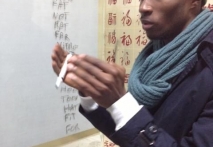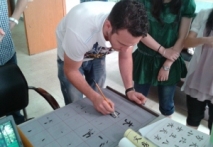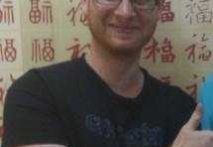Latest News
- Wuxi's Nanchang Street--a historic cultural district that combines classical charm, delicious food, and fun activities
- chinese study
- lastest courses
- Business Assistance/International Consortium of Stem Cell Research
- Foreigner's view of Jiangsu -Changzhou Jintan starts
- estimonials for Our new French Internship student Anais 企业表扬信
- The Double Seventh Festival in China Introduction
- Chinese Proficiency Test (HSK)
- China University Mining and Technology
- Wuxi Library
Students Say
Mandarin Student Zack
Mandarin Education School is a great place to learn Chinese and Chinese Culture.I've learned a lot in this school, my Chine...
Learn Chinese Travel China
If you want to learn Chinese and also discover China, Mandarin Education organize the most funny and cultural study tour.
The...
suzhou Mandarin Jude
I am Jude, I am learning Mandarin in Suzhou Mandarin School,I was learning in Wuxi Mandarin Education too.I like my Chinse Teacher...
chinese class
Improve your reading, speaking and your writing by experiencing our teaching methods,Offer free student Visa.
...
Wuxi Mandarin Jessie
I've learned Chinese for almost 8 years, I can understand what Chinese people say,but when I speak, I feel very uncomfor...
Chinese Internship or Jobs
You are looking for a professional experience abroad? Get the opportunity to discover the Chinese business,Look for an ...
Mandarinedu Student Florent
I love my Wuxi Mandarin Education School. It is the EASY MANDARIN Learning way, I am learning faster than I wanted.My teach...
Mandarin E Learning
Mandarin Education School offers you Online Chinese Courses. It has never been so easier to have Chinese courses ...
Mandarin Student Brad
I am studying Chinese in Mandarin Education School. I can speak quit good Chinese and talk to Chinese people by myself. Thank...
Wuxi Mandarin edu. Student Jennifer
I love learning Chinese in Mandarin Education School.That's a great place to learn and make friends.
...
Add Our School Official
to get more informations

0086 1866 1199 988
0086 510-81151808
Sandy.Swun
519988808
Mandarin Education School
Room 405, 4 Fl,Building No.8,
Maoye Business Center,
Chang jiang No.1,
New district , Wuxi City , China
Chinese grammar learning: the use of 就(jiù)
In Chinese language, the character就(jiù) is one of those very common parts of Chinese grammar that many students find confused. It says that 就 (jiù) doesn't have a corresponding meaning in English, but, frustratingly, that's all it says about it. What is the role of 就(jiù) in a Chinese sentence, and how is it needed and used in a more general sense in Mandarin?
1. Where should I place 就 in a sentence?
rder="1" style="border:medium none;background-color:#FFFFCC;width:365px;">
wŏmen xué wán le zhè kè kèwén
我们 学 完 了 这 课 课文
WE STUDY FINISH LE THIS KE LESSON
tā jiù néng huí jiā
他就 能 回 家
HE JIU CAN BACK HOME
He can go home as soon as we finish studying this lesson.
rder="1" style="border:medium none;background-color:#FFFFCC;width:365px;">
wŏ yì shuōhuà
我一 说话
I AS SOON AS SPEAK
tā jiù xiào
他 就 笑
HE JIU LAUGH
As soon as I speak he’ll laugh.
rder="1" style="border:medium none;background-color:#FFFFCC;width:365px;">
wŏ
我
I
bā diăn jiù lái le
八 点 就 来 了
8 O’ CLOCK JIU COME LE
I came here as early as 8 o’clock.
2. How do I use 就 to imply an action takes place earlier than I have expected?
就 can be placed after a time word to comment on the time which is earlier than you have expected.
rder="1" style="border:medium none;background-color:#FFFFCC;width:365px;">
tā
他
HE
jiŭ diăn jiù lái le xuéxiào
九点 就 来 了学校
9 O’ CLOCK JIU COME LE SCHOOL
He came to school as early as nine o'clock.
Comparing with 他九点来了学校. He came to school at 9.
3. Can 就 be used to imply anything else apart from “earlier than expected”?
就 can also be used to indicate that a preceded number word is a small number.
rder="1" style="border:medium none;background-color:#FFFFCC;width:365px;">
liăng ge rén
两 个人
TWO GE PEOPLE
jiù néng bàn hăo
就 能 办 好
JIUCAN DEAL WITH WELL/COMPLETE
......
It only takes two people to complete the job.
This sentence implies that the job is an easy one, and it only takes two people to complete. The speaker thinks two is a small number. 两个人能办好. It takes two people to complete the job. The speaker states a fact. The sentence has neither implicated the easiness nor the size of the number, which the above one has.
4. Can 就 be used for other purposes?
就 can also be used for emphasis.
rder="1" style="border:medium none;background-color:#FFFFCC;width:417px;">
tā jiù shi wŏ de lăo shī
他就是我的 老师
HE JIU IS MY TEACHER
He is my teacher.
jiù măi zhèxiē
就买 这些
JIU BUY THESE
I’ll just buy these.
wŏ jiù bú qù zhōngguó
我就不 去中国
I JIU NOT GO CHINA
I certainly don’t go to China.
就 is used in the following sentence constructions.
The following example shows that 就 is used to indicate that first action is immediately followed by second action.
rder="0" style="background-color:#FFFFCC;width:255.75pt;">
s. v.1 了 o.1
就 v.2 o.2 (了 )
tā xià le kè
他下 了课
HE FINISH LE LESSON
jiù qù tú shū guăn le 就去 图书馆 了
JIU GO LIBRARY LE
He went to the library after the class.
就 can also be used to indicate that as soon as the first action takes place, the second action will happen. The following pattern indicates that as soon as the action in the 一clause takes place, then it will be followed by the action which is in the 就 clause. Both 一 and 就 are adverbs, which should be placed before verbs. This pattern is often seen in a four-character expression.
rder="0" style="background-color:#FFFFCC;width:255pt;">
s. 一 v.1(o.1)
就 v.2 (o.2)
tā yì shōu
他一说
HE YI SPEAK
wŏ jiù kū
我 就 哭
I JIU CRY
A soon as he speaks I’ll start crying.
The difference between the above two examples is that the second example can be used for general descriptions, but the first is for a particular situation.










